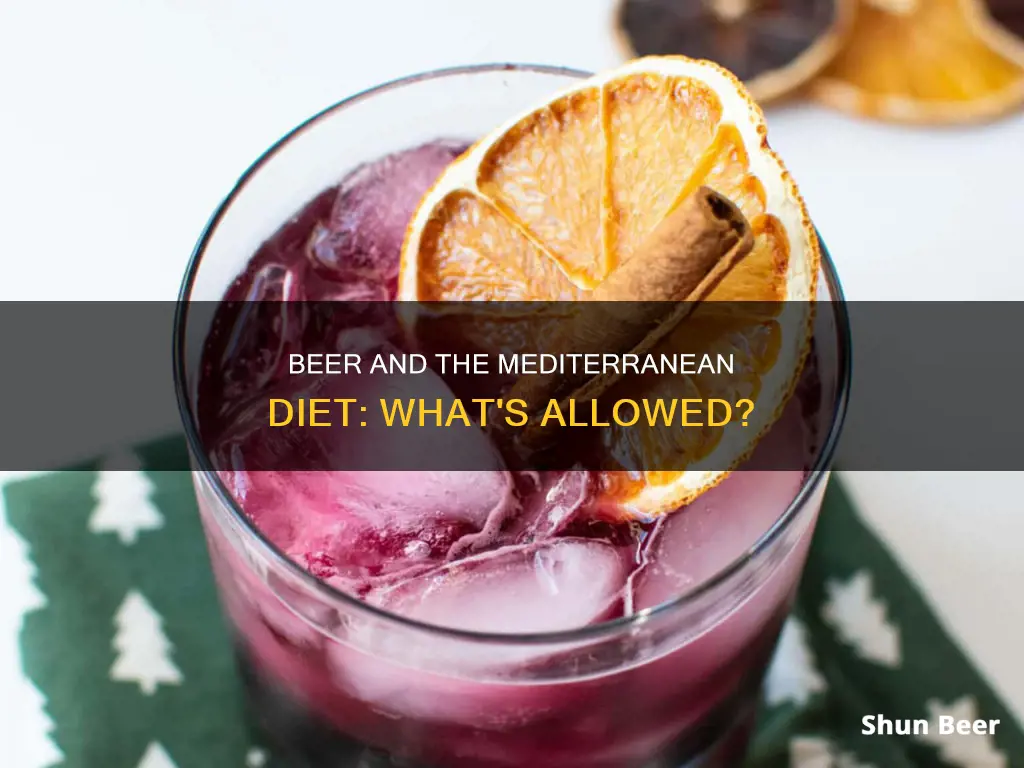
The Mediterranean diet is widely recognised as being highly effective for good health and reducing the risk of cardiovascular disease. It involves eating lots of vegetables, legumes, nuts, fruits, cereals, and fish, and limiting meat and dairy products. But what about alcohol? Can you drink beer on the Mediterranean diet? The answer is yes, but in moderation. Moderate drinking is considered to be up to two drinks per day for men and one per day for women. Alcohol, when consumed responsibly, is thought to be an important component of the Mediterranean diet and a contributor to a healthy lifestyle. However, it's important to note that excessive alcohol consumption can increase the risk of various cancers, especially breast cancer in women.
What You'll Learn
- Beer, wine, and liquor are all part of the Mediterranean diet when consumed in moderation
- The Mediterranean diet is associated with a reduced risk of cardiovascular disease
- The diet also includes plenty of fruits, vegetables, whole grains, nuts, legumes, and fish
- It is recommended to limit meat, poultry, and dairy products when following the Mediterranean diet
- Drinking alcohol with food, as is typical in Mediterranean countries, may reduce the harmful effects of alcohol

Beer, wine, and liquor are all part of the Mediterranean diet when consumed in moderation
The Mediterranean diet is highly effective for good health and is particularly useful in reducing the risk of cardiovascular disease. It involves eating lots of vegetables, legumes, nuts, fruits, cereals, and fish, and limiting meat and dairy products. It also includes drinking alcohol in moderation.
It is important to note that while alcohol can be a part of the Mediterranean diet, it is not necessary to pick up drinking if you do not already. The fresh and healthy foods included in the Mediterranean diet do much more than alcohol to protect your heart. Additionally, women with a family history of breast cancer are advised to avoid drinking, as alcohol has been linked to increased rates of breast cancer, especially with certain diets such as those high in processed foods.
The way alcohol is consumed is also important to consider. In Mediterranean countries, drinking typically occurs during a meal, which slows the rate of alcohol absorption and limits dangerous spikes in blood alcohol levels. Even when alcohol is consumed without a meal, it is usually accompanied by a small amount of food. This cultural pattern of drinking may be a factor in the health benefits associated with moderate alcohol consumption in the Mediterranean diet.
Beer and Zyrtec: What You Should Know
You may want to see also

The Mediterranean diet is associated with a reduced risk of cardiovascular disease
One of the key benefits of the Mediterranean diet is its positive impact on cardiovascular health. Research has shown that this diet can help lower the risk of cardiovascular disease, including heart attacks and strokes. The diet's emphasis on plant-based foods, healthy fats, and limited intake of red meat contributes to this reduced risk.
The Mediterranean diet is also associated with improved blood pressure, cholesterol, and blood sugar levels, which are important factors in maintaining cardiovascular health. Additionally, the diet's anti-inflammatory properties can help reduce the risk of atherosclerosis and other cardiovascular issues.
Another factor that contributes to the reduced risk of cardiovascular disease is the moderate consumption of red wine, which is typically included in the Mediterranean diet. Studies have shown that drinking small servings of red wine with meals can provide cardio-protective effects. However, it is important to note that alcohol consumption should always be moderated, and individuals should consult with their healthcare providers to weigh the benefits and risks.
The Mediterranean diet also promotes a healthy weight, which is crucial for cardiovascular health. The high fiber content of the diet helps individuals feel fuller for longer, reducing the likelihood of overeating and maintaining a healthy weight.
In addition to its cardiovascular benefits, the Mediterranean diet has been linked to improved brain health, weight management, and a reduced risk of certain types of cancer and type 2 diabetes. The combination of nutrients provided by the diet, including healthy fats, antioxidants, and fiber, contributes to its overall health benefits.
Champagne and Beer: A Perfect Pair?
You may want to see also

The diet also includes plenty of fruits, vegetables, whole grains, nuts, legumes, and fish
The Mediterranean diet is considered one of the healthiest in the world, and it includes a drink or two as an integral part. While alcohol consumption has been linked to an increased risk of certain cancers, studies have found that moderate drinking—especially when accompanied by a Mediterranean meal—may not be harmful.
The Mediterranean diet includes plenty of fruits, vegetables, whole grains, nuts, legumes, and fish. These foods contain protective substances that help counter the harmful effects of alcohol. For example, extra virgin olive oil, a key component of the Mediterranean diet, contains anti-oestrogens that block the carcinogenic actions of oestrogens, which are raised by alcohol consumption and increase the risk of breast cancer. The folates found in large quantities in green, leafy vegetables and pulses have also been shown to provide protection against the effects of alcohol.
In addition to its protective effects, the Mediterranean diet offers a variety of other health benefits. It is the leading diet for reducing the risk of cardiovascular disease, and there is increasing evidence linking it to a decreased risk of dementia. The diet's high consumption of plant foods, cereals, and olive oil, along with low intake of red meat, contributes to its cardio-protective effects.
It is important to note that heavy drinking increases the risk of various cancers and other health issues. However, moderate consumption of alcohol, such as one or two glasses of wine, when accompanied by a Mediterranean meal, may not have the same detrimental effects.
While alcohol can be a part of the Mediterranean diet, it is essential to prioritize healthy eating patterns and ensure that alcohol intake is within recommended guidelines.
Do Sulfite Wands Really Work for Beer?
You may want to see also

It is recommended to limit meat, poultry, and dairy products when following the Mediterranean diet
The Mediterranean diet is based on foods available in countries that border the Mediterranean Sea. It is mostly plant-based and includes an abundance of fruits, vegetables, whole grains, nuts, legumes, and olive oil. The diet recommends limiting meat, poultry, and dairy products, which are consumed in low to moderate amounts a few times a week.
Historically, people in the Mediterranean only ate what their land produced, which was mostly fruits and vegetables. Meat consumption was limited as animals were expensive and required a lot of land to graze. Today, the Mediterranean approach to meat consumption is to adopt a "less is more" attitude. This means using smaller quantities of meat to enhance the flavour of a meal, such as adding a bit of crispy pancetta to a pot of beans or garnishing a salad with a few strips of prosciutto.
The Mediterranean diet recommends choosing white meat instead of red meat and limiting red meat to no more than one serving per week. When consuming red meat, it is best to opt for lean cuts such as tenderloin, sirloin, and flank steak. Poultry is also consumed in moderate, 3- to 4-ounce portions. Dairy products such as cheese and yogurt are recommended to be consumed in low to moderate amounts daily.
Following these guidelines and limiting meat, poultry, and dairy products can provide numerous health benefits. The Mediterranean diet has been shown to reduce the risk of heart disease, metabolic syndrome, diabetes, certain cancers, and depression. It also promotes a healthy balance of gut microbiota and supports healthy blood sugar levels, blood pressure, and cholesterol.
Drinking Beer While Driving in Victoria: What's Allowed?
You may want to see also

Drinking alcohol with food, as is typical in Mediterranean countries, may reduce the harmful effects of alcohol
The Mediterranean diet is rich in protective substances that counter alcohol's harmful effects. For example, extra virgin olive oil, which is a staple of the Mediterranean diet, contains anti-oestrogens that block the carcinogenic actions of oestrogens, thus reducing the risk of breast cancer. Folates, found in large quantities in green leafy vegetables and pulses, also provide protection against the effects of alcohol.
In addition to the benefits of specific foods in the Mediterranean diet, the act of drinking with food can also reduce harmful effects. A full stomach of food slows the rate of alcohol absorption, limiting dangerous spikes in blood alcohol levels that are linked to high blood pressure and strokes. This is because the pyloric valve, which separates the stomach from the small intestine, closes when food is present, keeping alcohol from entering the small intestine, where most of it is absorbed. Drinking with food also reduces the hazards of smoking, as alcohol acts as a solvent that increases the absorption of carcinogens in cigarette smoke.
Furthermore, a scoring system developed to capture the Mediterranean way of drinking showed that moderate alcohol intake spread out over the week, a preference for red wine drunk with meals, little intake of spirits, and an avoidance of binge drinking, correlated with significantly reduced mortality. While heavy drinking and even low alcohol consumption with certain diets can increase the risk of various cancers, drinking a glass or two of wine with a Mediterranean meal does not appear to be harmful.
Combining Beer and BCAAs: What You Need to Know
You may want to see also
Frequently asked questions
Yes, you can drink beer on the Mediterranean diet, but only in moderation.
Generally, moderate drinking is considered up to two drinks per day for men and one per day for women.
Drinking beer in moderation on the Mediterranean diet can improve health and reduce the risk of cardiovascular diseases.
Yes, heavy drinking increases the risk of various cancers, especially breast cancer in women. Even low alcohol consumption may increase the risk of certain cancers when combined with diets high in processed foods.







